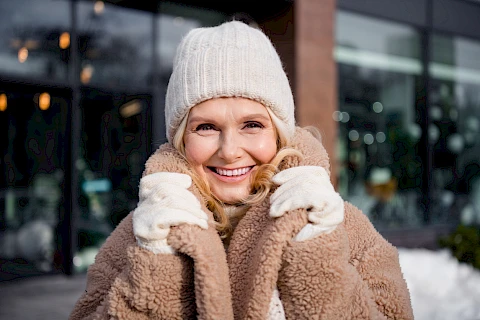
Winter’s crisp air and serene landscapes come with challenges that can affect seniors more acutely. The season’s colder temperatures and icy conditions increase risks for illness and injuries, making proactive steps essential. With thoughtful preparation, seniors can enjoy winter safely and comfortably, avoiding common seasonal pitfalls.
Dressing for Warmth
Proper clothing is one of the most effective ways to combat the cold. Layering is crucial for insulation. Start with a base layer that wicks moisture away from the skin to keep you dry and warm. Add a middle layer for insulation, like a sweater or fleece. Finish with a waterproof and windproof outer layer to protect against the elements.
When it comes to accessories, don't forget a warm hat, scarf, and gloves. These items are vital, as much of our body heat escapes from our heads and hands. Also, make sure to cover the neck with a scarf to shield against cold winds. Footwear is equally important. Choose boots that provide warmth and good traction. Soles with excellent grip can help prevent slips on icy surfaces.
Fall Prevention
Winter can turn everyday environments into potential hazard zones. Identifying common fall hazards is the first step in preventing accidents. Ice, snow, and slippery surfaces are the main culprits during cold months.
When walking outdoors, take small, careful steps. If a walking cane or walker is used, ensure it has a non-slip rubber tip for extra support. Sand or salt slippery areas around the home to keep entryways safe.
Maintaining a Warm Home Environment
A warm home is essential for health and comfort. Check that the heating system is working efficiently and is well-maintained. Replace filters regularly and schedule annual inspections to avoid breakdowns.
Insulation can make a significant difference in retaining heat. Ensure windows and doors are properly sealed to prevent drafts. For a more energy-efficient solution, invest in thermal curtains or storm windows. Simple steps like closing off unused rooms and using door sweeps can also conserve heat.
Recognizing Cold-Related Illnesses
Seniors are particularly susceptible to cold-related illnesses such as hypothermia and frostbite. Being vigilant about recognizing the signs can prevent serious health issues.
Hypothermia occurs when body temperature drops to dangerous levels. Symptoms include shivering, confusion, and exhaustion. If you suspect hypothermia, seek medical help immediately.
Frostbite typically affects extremities like fingers, toes, and ears. It can cause numbness and color changes in the skin. In severe cases, it can lead to permanent damage. Monitor seniors closely for these signs, especially if they spend time outdoors.
Keep Seniors Comfortable and Safe This Winter
Winter safety is all about being proactive. Caregivers can protect seniors from cold-related risks by following these simple yet effective tips. From dressing warmly and preventing falls to maintaining a cozy home and watching for illnesses, preparation makes all the difference.
At Senior Helpers Ann Arbor, we are committed to supporting seniors and their families during the colder months. If you need personalized assistance or more advice, contact us. Our team is ready to assist seniors in Adrian, Ann Arbor, Ypsilanti, Jackson, and Hillsdale. Let's work together to ensure a safe and comfortable winter.